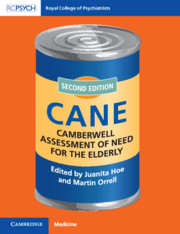Book contents
- Camberwell Assessment of Need for the Elderly
- Camberwell Assessment of Need for the Elderly (CANE)
- Copyright page
- Contents
- Figures
- Tables
- Contributors
- Acknowledgements
- Chapter 1 An Introduction to Needs Assessment and Use of the Camberwell Assessment of Need for the Elderly
- Chapter 2 Self-Reported Needs of People with Dementia Living at Home
- Chapter 3 Needs of Older Primary Care Patients
- Chapter 4 Unmet Needs of Older Persons with and Without Depression in Residential Homes
- Chapter 5 Needs of Older People Living Alone
- Chapter 6 Needs Assessment of People with Dementia and Impact of Caregiver Burden
- Chapter 7 Crisis and Assessment of Need in Dementia
- Chapter 8 Needs of People with Young-Onset Dementia
- Chapter 9 Needs of Older People in Long-Term Care Settings
- Chapter 10 Needs and Healthcare Costs in Old Age
- Chapter 11 The Future of Needs Assessment Research
- Instructions for the CANE
- Index
- References
Chapter 5 - Needs of Older People Living Alone
A Critical Review
Published online by Cambridge University Press: 10 June 2021
- Camberwell Assessment of Need for the Elderly
- Camberwell Assessment of Need for the Elderly (CANE)
- Copyright page
- Contents
- Figures
- Tables
- Contributors
- Acknowledgements
- Chapter 1 An Introduction to Needs Assessment and Use of the Camberwell Assessment of Need for the Elderly
- Chapter 2 Self-Reported Needs of People with Dementia Living at Home
- Chapter 3 Needs of Older Primary Care Patients
- Chapter 4 Unmet Needs of Older Persons with and Without Depression in Residential Homes
- Chapter 5 Needs of Older People Living Alone
- Chapter 6 Needs Assessment of People with Dementia and Impact of Caregiver Burden
- Chapter 7 Crisis and Assessment of Need in Dementia
- Chapter 8 Needs of People with Young-Onset Dementia
- Chapter 9 Needs of Older People in Long-Term Care Settings
- Chapter 10 Needs and Healthcare Costs in Old Age
- Chapter 11 The Future of Needs Assessment Research
- Instructions for the CANE
- Index
- References
Summary
In a rapidly ageing world, more and more older people live alone.1 Whereas almost one-third of the older adult population in the United States lives alone,2 more than 50% of those over age 75 in the United Kingdom live by themselves.3 Although this phenomenon varies widely throughout the world (mainly observed in developed countries), its social relevance and study have increased in recent decades.4 In general terms, older people who live alone tend to be elderly women, widowed spouses, have a higher level of education and tend to use health services more often than those who live accompanied.1–6 Nevertheless, the amount of information available about this population is still sparse.
- Type
- Chapter
- Information
- Camberwell Assessment of Need for the ElderlyCANE, pp. 44 - 51Publisher: Cambridge University PressPrint publication year: 2021



